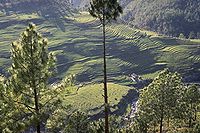Course:SOIL520
| Agricultural Watershed Management | |
|---|---|
 | |
| SOIL 520 | |
| Section: | 001 |
| Instructor: | Sean Smukler |
| Email: | sean.smukler@ubc.ca |
| Office: | MCML 123 |
| Office Hours: | By appointment |
| Class Schedule: | Online course |
| Classroom: | |
| Important Course Pages | |
| Syllabus | |
| Lecture Notes | |
| Assignments | |
| Course Discussion | |
Agricultural Watershed Management
***Please note that this course will not be offered in the Winter 2021 Academic Year.***
Course Overview
This course presents a comprehensive approach to agricultural watershed management. It is intended for community leaders, professionals and graduate students interested in integrated water resource management in agricultural settings. It is offered as a distributed learning course using an online App textbook which contains the course material, and the Course Blog for a detailed schedule, class discussions, updates and assignments.
The course is equivalent to a 3-credit graduate level course and students can register for UBC academic credit in SOIL 520.
The course has the following components:
- A multimedia e-textbook App that can be accessed online from your desktop and most mobile platforms (iOS, Android) - see "E-Textbook" section below.
- All course information is posted on the Course Blog, which contains course announcements, discussion boards, links to supplemental readings, etc.
- Assignments will be posted on the Course Blog.
Course instructor: Sean Smukler (sean.smukler@ubc.ca)
*Please note that this course will not be offered in the Winter 2021 Academic Year. SOIL 520 is usually offered in Winter Term 2.
Prerequisites
A Bachelor’s degree in a related field, such as environmental sciences, engineering, planning, geography or biology is recommended. Academic or professional experience related to land and water resource management in an agricultural context is desirable.
There are no course prerequisites.
Relation to the Watershed Science Course
UBC also offers a course in Watershed Science (LWS/SOIL 515), which covers the principles of watershed management in a more general manner. The Agricultural Watershed Management course is different in that it focuses on agricultural watersheds and their specific land use, hydrology and water quality issues, and also the role of community groups and local governments. The Watershed Science course is not a prerequisite to taking this course; however, those with limited knowledge about watershed issues are encouraged to take LWS/SOIL 515 first (or concurrently), since it is an introduction to the topic. Those who have already taken LWS/SOIL 515 and are interested in agricultural issues will find this course a great follow-up. There is limited overlap in content between the two courses.
For further interest, the Watershed Management course series also offers SOIL 516 - Urban Watershed Management and SOIL 518 - Water in International Development.
Assessment and Grading
This is a distributed learning course and the students are expected to read all the material in the online textbook, as it corresponds to the weekly course schedule. Grading will be based on two written assignments, participation in the online discussions, and a final project.
| Component | Grading |
|---|---|
| Assignment #1: Term paper | 25% of final mark |
| Assignment #2: Term paper | 25% of final mark |
| Final Project | 40% of final mark |
| Course Participation (Discussions) | 10% of final mark |
Questions will be posted on the online discussion board every month and we expect students to take an active role and respond to each question on a regular basis (within 2-3 weeks). All responses will be posted on Course Blog and all participants can read and respond to the contributions.
The final project will build from the materials presented in the online textbook, assignments and discussions throughout the term.
All assignments and exams will be marked using the UBC grading scale. Final mark for UBC graduate credit = 3 credits.
Academic Integrity
The academic enterprise is founded on honesty, civility, and integrity. As members of this enterprise, all students are expected to know, understand, and follow the codes of conduct regarding academic integrity. At the most basic level, this means submitting only original work done by you and acknowledging all sources of information or ideas and attributing them to others as required. This also means you should not cheat, copy, or mislead others about what is your work. Violations of academic integrity (i.e., misconduct) lead to the breakdown of the academic enterprise, and therefore serious consequences arise and harsh sanctions are imposed. For example, incidences of plagiarism or cheating may result in a mark of zero on the assignment or exam and more serious consequences may apply if the matter is referred to the President’s Advisory Committee on Student Discipline. Careful records are kept in order to monitor and prevent recurrences.
E-Textbook
The main readings for the SOIL 520 course are based upon the Agricultural Watershed Management online e-textbook, developed by Dr. Hans Schreier's online learning team. The e-textbook can be accessed through your web browser on your desktop and most mobile devices (iOS, Android). Access to the e-textbook is restricted to students in the SOIL 520 course, and is password protected.
The access link and password will be sent to students during the first week of class.